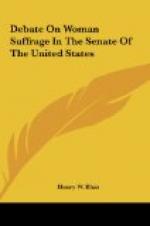vote, in November, 1876. Not only these eleven
States, but in nearly all the other Northern and
Western States women are elected to the offices
of county and city superintendent of public schools
and as members of school boards. In Louisiana
the constitution of 1879 makes women eligible to
school offices.
It may also be observed as indicating a rising and controlling public sentiment in recognition of the right and capacity of woman for public affairs that she is eligible to such offices as that of county clerk, register of deeds, and the like in many and perhaps in all the States. Kansas and Iowa elected several women to these positions in the election of November, 1885, while President Grant alone appointed more than five thousand women to the office of postmaster; and although many women have been appointed in the Departments and to pension agencies and like important employments and trusts, so far as your committee are aware no charge of incompetency or of malfeasance in office has ever yet been sustained against a woman.
It may be further stated in this connection that nearly every Northern State has had before it from time to time since 1870 a bill for the submission of the question of woman suffrage to the popular vote. In some instances such a resolution has been passed at one session and failed to be ratified at another by from one to three votes; thus Iowa passed it in 1870, killed it in 1872; passed it in 1874, failed to do so in 1876; passed it in 1878, and failed in 1880; passed it again in 1882, and defeated it in 1884; four times over and over, and this winter these heroic and indomitable women are trying it in Iowa again.
If men were to make such a
struggle for their rights it would be
considered a fine thing, and
there would be books and even poetry
written about it.
In New York, since 1880, the women have urged this great measure before the Legislature each year. There it takes the form of a bill to prohibit the disfranchisement of women. This bill has several times come within five votes of passing the assembly.
In many States well sustained efforts for municipal suffrage have been made, and, as if in rebuke to the conservatism, or worse, of this great Republic, this right of municipal suffrage is already enjoyed in the province of Ontario, Canada, and throughout the island of Great Britain by unmarried women to the same extent as by men, there being the same property qualification required of each.
The movement for the amendment of the National Constitution began by petitioning Congress December, 1865, and since 1869 there have been consecutive applications to every Congress praying for the submission to the States of a proposition similar to the joint resolution herewith reported to the Senate.
The petitions have come from all parts of the country; more especially from the Northern




